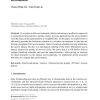163 search results - page 9 / 33 » How Optimal are Wireless Scheduling Protocols |
INFOCOM
2009
IEEE
14 years 2 months ago
2009
IEEE
—Congestion control in wireless multi-hop networks is challenging and complicated because of two reasons. First, interference is ubiquitous and causes loss in the shared medium. ...
IPSN
2004
Springer
14 years 21 days ago
2004
Springer
We propose a distributed on-demand power-management protocol for collecting data in sensor networks. The protocol aims to reduce power consumption while supporting fluctuating dem...
INFOCOM
2010
IEEE
13 years 5 months ago
2010
IEEE
—Opportunistic routing significantly increases unicast throughput in wireless mesh networks by effectively utilizing the wireless broadcast medium. With network coding, opportun...
INFOCOM
2010
IEEE
13 years 4 months ago
2010
IEEE
Information theoretic Broadcast Channels (BC) and Multiple Access Channels (MAC) enable a single node to transmit data simultaneously to multiple nodes, and multiple nodes to trans...
DPD
2007
13 years 7 months ago
2007
In wireless mobile environments, data broadcasting is an effective approach to disseminate information to mobile clients. In some applications, the access pattern of all the data c...


